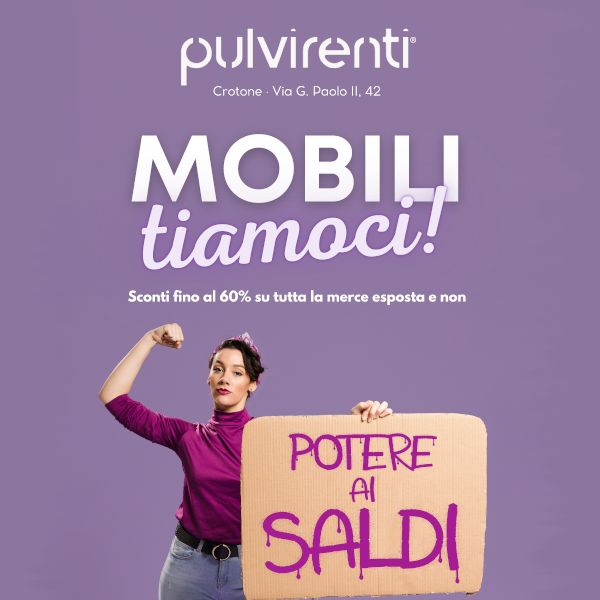“Always with the sole and sole aim of giving correct information to citizens and without fueling sterile and instrumental controversies in any way, we intend to clarify some interpretative doubts on the rules that regulate itinerant (or so-called itinerant) trade”.
This is what the Commander writes Local police of Crotone, Francesco Iorno who with a note wanted first of all to make one known first distinction between authorized sellers to retail trade in public areas and on concession stands (by common definition so-called type A licence); sellers authorized to retail trade in public areas and in any area as long as it is itinerant (by definition of municipalities, so-called type B licence); and whoever they are totally without authorization to retail trade.
“The first – explains Iorno – are the sellers who participate in a Public Notice announced by the municipal bodies to obtain the assignment of a parking area during fairs and/or markets. The assigned places are specific and valid for several years. The latter (which are the ones that occupy us in the media debate of the last few days) are those who are commonly defined as street vendors and who can sell in public areas of the municipal territory. Finally, third parties are those who, as they lack authorization, are the only ones who can commonly be defined as abusive sellers”.
“Only with reference to third parties, Legislative Decree 114/1998 (national law), in art. 29, provides that anyone who carries out trade in public areas without the required authorization is punished with the administrative sanction of the payment of a sum to be 5,000,000 to 30,000,000 lire and with the confiscation of equipment and goods” specifies the commander.
“Now, for the sake of brevity and without pretending to get into legal technicalities, it is only useful to explain that the application of the sanction (which was originally in lire) is calculated at double the minimum (barring repeat offenses) reported today in euros to the sum of 5,164 euros (equal to the old 10 million lire), in addition to the confiscation of goods and equipment. This is to clearly explain that the Local Police operator who finds himself verifying the presence of a so-called “illegal street vendor”, those of the third case in our example, and only in this case, is obliged to apply the sanctions indicated above , without the latter having the possibility of reviewing the amount of the sum foreseen (not by him but by the Law), on the economic conditions of the offender or on the damage that this sanction may cause to him” he continues.
“Nor can the Local Police officer be reminded of unspecified principles of common sense, given that the scope of the rule is imperative and leaves no room for subjective interpretations since he, in the event of failure to act, would be responsible for the crime referred to in art. 328 of our Criminal Code” highlights.
“It is hardly necessary to specify that the street vending authorization can be suspended by the body that issued it and in this case, for the entire period of suspension, the seller will be considered abusive for all purposes. Having said this, in the hope of having dispelled the doubts that often lead to difficulties in understanding some situations linked to the extent of the sanctions and the reasons that underlie them” Iorno further points out.
“Let us instead come to the questions that often arise lead citizens to think that the street vendor must be constantly moving and cannot stay in the same place for any longer, which are also widespread in common knowledge but, unfortunately, incorrect with respect to current regulatory provisions. The previous Regional Law (obviously of Calabria) n. 18 of 11 June 1999 in effect until 2018 established, in article 8 paragraph 3 that: “The exercise of trade in an itinerant form allows for stops for the time necessary to serve customers and, in any case, not exceeding an hour’s stay in the same point, with the obligation to move at least 500 meters after said period and a ban on returning to the same point during the day”.
“Such a prediction – goes on – it was revoked with the introduction of Regional Law (obviously of Calabria) n. 24 of 3 August 2018, which, in also providing other simplifying criteria for obtaining authorization, in art. 4 paragraph 1 introduced an innovative and truly unique provision in the scenario of trade regulations. In fact, in article 4 paragraph 1 Letter C, it verbatim establishes that: “The parking limits and travel obligations do not apply where no other operator is present at the same point.”; This provision was challenged for constitutional illegitimacy by the Council of Ministers with Resolution of 27 September 2018. However, the Constitutional Court, with Sentence no. 164 of 21 May 2019 declared its constitutional legitimacy and therefore made it fully effective”.
“Therefore, to summarize the issue, today itinerant vendors, equipped with a type B authorization, can, in the Calabria Region, station themselves in a public place without time limits, provided that no other operators present themselves on the site. At the conclusion of the reasoning addressed so far, it becomes easy to understand how the highest sanction (that of over 5 thousand euros) must be imposed on those who do not have authorization while it remains prohibited, even for those who have the required authorization, but with lesser sanctions: parking and stopping on roads where the Highway Code prescribes such prohibitions (articles 7, 158 and 20 of the Highway Code); the display of goods on the ground or on public land or in any case beyond the perimeter of the vehicle used for itinerant sales. The above in the hope of having provided correct and clear information for the benefit of greater and better knowledge of all citizens” concludes Commander Iorno.








